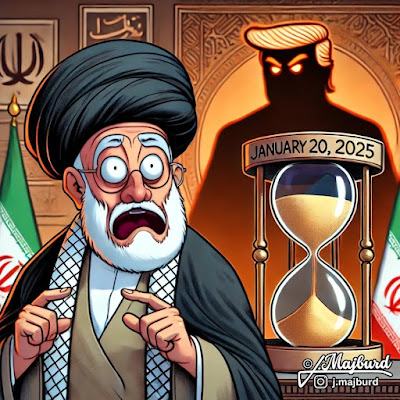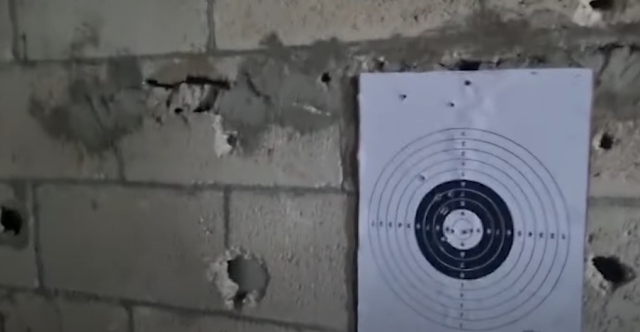Seth Mandel: The Deal: A Guide for the Perplexed
What’s good about this for Israel:Will Palestinians Give Peace a Chance?
—The reunions of more than two dozen hostages with their families is obviously top-of-mind. The country has been tormented for fifteen months over its missing, during which time Hamas’s cruelty has been boundless. Hostages have been tortured, abused, starved and humiliated—children and adults alike—and many of their families have been left to wonder if they are even still alive. Unlike Hamas, Israelis so value the lives of their fellows that every returned captive brings some relief to a suffering country.
—Israel will also have delivered for Donald Trump, whose envoys bulldozed all Israeli concerns so that he could begin his second term with a win. Delivering for an incoming president rather than an outgoing president means Israeli leaders believe (or live in hopes) that their concerns on other regional issues will be heard. That could mean an improvement in the flow of U.S. arms and aid, cooperation on limiting or destroying Iran’s nuclear program, support for Israel’s operations in Syria and Lebanon, Saudi normalization, and a suitably aggressive posture toward the ICC and the UN as well as any countries that are tempted to join their extrajudicial harassment of Israel and Israelis.
—Retaining some control over the Philadelphi Corridor is crucial to preventing the resumption of smuggling routes underneath Rafah and into Egyptian territory. Holding buffer zones along the rest of the border means the Israeli communities in the “Gaza envelope” will be better protected and will facilitate the deployment of troops back into Gaza hotspots. So long as Israeli troops control both sides of all Israel-Gaza borders, those borders will be more secure than they have been, arguably since 1948.
—Any significant reduction in fighting, even if temporary, will boost Israel’s economy and relieve some of the strain on its 300,000 reservists.
What’s bad about this for Israel:
—The withdrawal of troops to a buffer zone will guarantee Hamas survives for now and coalesces support and recruits while it has the chance. In turn, that means the IDF will be back in the parts of Gaza it is currently leaving. The war goes on under the façade of “peace.”
—The honeymoon from conventional Western policy toward the Middle East is over. In Trump’s first term, he put together a team of envoys that questioned stale thinking and thereby facilitated perhaps the most important regional diplomatic breakthroughs since the 1979 Egypt-Israel peace deal. This team featured US Ambassador David Friedman, Jared Kushner, Jason Greenblatt and others. This time, Trump’s envoy is Steve Witkoff, who is content to carry the outgoing Biden administration’s policies across the finish line, which are based on the age-old—and failed—protection of Hamas’s legitimacy and a bias toward the status quo.
—Israel has agreed to leave the Netzarim Corridor, a road that bisects Gaza and enables the IDF to contain recurring spurts of violence from spilling over into the rest of the enclave. That corridor begins right near Kibbutz Be’eri, where Hamas terrorists slaughtered over 100 civilians and took thirty hostages in the early hours of its Oct. 7 invasion. Israel’s disengagement from the corridor will mean it is facilitating the return of Gazans to their homes in the north before many of Israel’s own citizens can safely return to their homes near Gaza.
—The release of violent Palestinian terrorists and inmates will represent security threats, boost loyalty to Hamas and in some cases Hamas’s manpower, and incentivize the taking of future hostages. Hostage-taking, in fact, will be seen as the only successful method of Palestinian “resistance” and the only consistent advantage that terrorist groups have over the West.
—Qatar, the longtime patron of Hamas, facilitated this deal, and in doing so, displayed the considerable influence it will have over a Trump White House.
What’s good about the deal for the Palestinians:
—The ability for many to return to their homes amid a reprieve in Gaza’s longest war. Israel will continue providing the strip with humanitarian aid.
What’s bad about it for the Palestinians:
—Hamas was the reason for the devastation in Gaza, and Hamas is being left in power, which means any reprieve is temporary.
~The survival of Hamas, even in a greatly weakened state, means Mahmoud Abbas will die without seeing the return of the Palestinian Authority to the territory it lost to Hamas. This means Hamas’s influence in the West Bank will surge despite Israel’s devastation of it. The Hamasification of the West Bank, in turn, would sound the death knell for Palestinian self-determination, since there will be no Palestinian party to negotiate with Israel and both Palestinian territories will slide into Iranian satrapy.
If there's ever going to be lasting peace between Israelis and Palestinians, the Palestinians must do something they've avoided for nearly 80 years: accept the permanency and legitimacy of the Jewish state.Terrorist releases in exchange for hostages threaten even more Israeli lives
Since Oct. 7, most Israelis have become increasingly disillusioned when it comes to peace with the Palestinians. On the Palestinian side, a series of recent polls found that many Palestinians in both Gaza and the West Bank still believe Hamas was justified in carrying out their Oct. 7 assault. Moreover, Palestinians remain broadly opposed to the idea of a two-state solution, the favored approach of international politicians, scholars, and peace advocates for decades.
Since Israel's founding, the complete ideological rejection of any Jewish state between the Jordan River and the Mediterranean Sea has been a pillar of Palestinian identity. Treating Israel as anything but a blemish or temporary aberration that can and will be undone with enough determination would be sacrilege in many Palestinian homes. It is precisely this maximalist Palestinian ideology that is at the heart of the conflict.
Going forward, earnest diplomats and committed mediators who have continually avoided this long-held rejectionist view will need to wake up, get real, and have honest discussions with Palestinians. As a first step, outsiders should resist the common knee-jerk reaction of dismissing hard truths. The deep-seated Palestinian vision anchored to endless struggle and never-ending resistance is what keeps the conflict going.
Unless the Palestinians finally acknowledge Israel's right to exist, no land, no new borders, and no other concessions will lead to lasting peace. Palestinians have the power to end the conflict - and it's time we recognize that.
Many Israelis will say that the hostage release deal under discussion is sad but necessary—that it is the government’s moral obligation to free as many hostages as possible, as soon as possible, despite the high price, and that the suffering of our hostages and their families is intolerable on the personal and national levels.
Many will say that giving freed hostages a national hug will be the greatest triumph of all—something so necessary for Israel’s collective spirit and its resilience over the long term.
Many Israelis might feel this to be so even if the deal entails a near-total withdrawal of the Israel Defense Forces from the Gaza Strip. In other words, even if Hamas retains power and survives to fight another day.
However one finesses the diplomatic and defense dilemmas here, there is one additional grand security calculus that seems absent from public discourse: the piercingly high price of releasing many Palestinian terrorists from Israeli jails which will be part of any deal.
The released terrorists assuredly will strike again with God-only-knows how many Israeli casualties in the future. Their release certainly will incentivize future kidnappings, pour gasoline onto the terrorist fires already raging in Judea and Samaria, and catapult Hamas toward its intended takeover of Judea and Samaria, too.
I know this because its has been the case with every previous terrorist release. Israel has repeatedly erred by letting terrorists loose to murder more Israelis.
Each time, in advance of every deal, the Israeli “security establishment” arrogantly and falsely has assured Israeli politicians and the public that it “would know how to manage the situation,” i.e., how to track the terrorists and crush any nascent return to terrorist activity without too much harm done.
But this has never proven to be true. Every deal involving the release of terrorists has led to more bloodshed, planned and carried out by these released terrorists.





 Buy
Buy 































.jpg)





